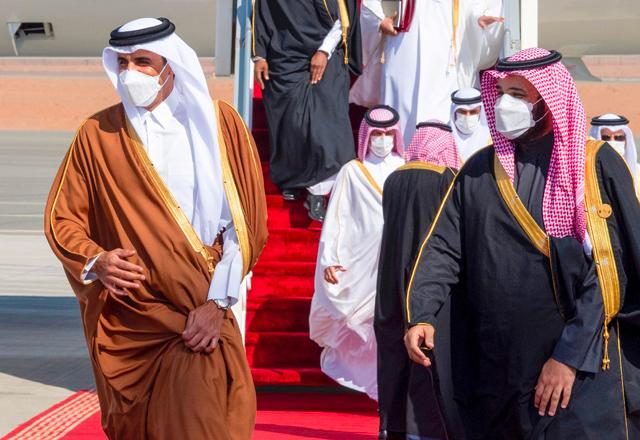- International News
- Web-2021-01-06 | 07:05 pm

Nayrouz News Agency : Saudi Arabia and its allies have restored full relations with Qatar, Riyadh said on Tuesday after a landmark summit, ending a damaging rift that erupted in 2017.
Four nations, led by Saudi Arabia, cut ties and transport links with Qatar in June that year, alleging it was too close to Iran and backed radical Islamist groups — allegations Doha denied.
But Saudi said that the United Arab Emirates, Bahrain and Egypt were joining it in reestablishing ties with Qatar, whose ruler was greeted with a warm embrace on arrival in the kingdom by Crown Prince Mohammed Bin Salman.
"What happened today is... the turning of the page on all points of difference and a full return of diplomatic relations,” Saudi Foreign Minister Prince Faisal Bin Farhan said following the landmark summit in the desert city of Al Ula.
Leaders of the six-member Gulf Cooperation Council(GCC) signed two documents on Tuesday, the Al Ula Declaration and a final communique. They are general in terms, but Prince Mohammed said the agreement affirms "our Gulf, Arab and Islamic solidarity and stability”.
He called for unity to confront challenges facing the region, singling out "the threats posed by the Iranian regime’s nuclear and ballistic missile programme and its plans for sabotage and destruction”.
The GCC consists of three of the countries that boycotted Qatar - Saudi, the United Arab Emirates and Bahrain — neutral Oman and Kuwait, and Qatar.
Prince Mohammed extended an enthusiastic welcome to Qatar’s Sheikh Tamim Bin Hamad Al Thani, after the emir landed in the kingdom for the first time since the crisis began.
Sheikh Tamim was whisked with the other leaders through Al Ula’s dramatic Martian landscape to the shimmering Maraya Concert Hall, a mirrored structure situated in a nearby valley.
Later, Saudi state media tweeted a photo of the young Saudi leader behind the wheel of his sports utility vehicle, taking Sheikh Tamim on a tour of the area.
US cheerleading
Washington had intensified pressure for a resolution to what Doha calls a "blockade”, insisting Gulf unity is necessary to isolate US foe Iran as the curtain falls on Donald Trump’s presidency.
Jared Kushner, Trump’s son-in-law and senior adviser who shuttled around the region to seek a deal, attended the signing in Al Ula.
"The Trump administration will claim this as another victory for sure,” said Royal United Services Institute analyst Tobias Borck.
Kuwaiti Foreign Minister Ahmad Nasser Al Sabah announced on state television on Monday that an agreement had been struck to open all the borders between Saudi and Qatar with immediate effect.
Drivers south of Doha on the usually calm Salwa highway towards the Saudi border at Abu Samra sounded their horns and waved their arms from their car windows in the wake of the announcement, an AFP correspondent reported.
"We will see all Saudis here, also all Qataris will visit Saudi Arabia, and we will be friends as we were before and better,” said Doha-based Hisham Al Hashmi, a Qatari with an Emirati mother, who wore a traditional thobe and winter headdress.
Lingering resentment?
The Saudi-led GCC hawks, along with Egypt, in 2017 closed their airspace to Qatari planes, sealed their borders and ports, and expelled Qatari citizens. An information battle raged online with the two camps trading barbs, deepening the resentments.
Prime Minister Sheikh Mohammed Bin Rashid Al Maktoum, who is also the ruler of Dubai, said the summit had brought unity to the region.
"The changes and challenges surrounding us require strength, cohesion and real Gulf cooperation,” he tweeted.













